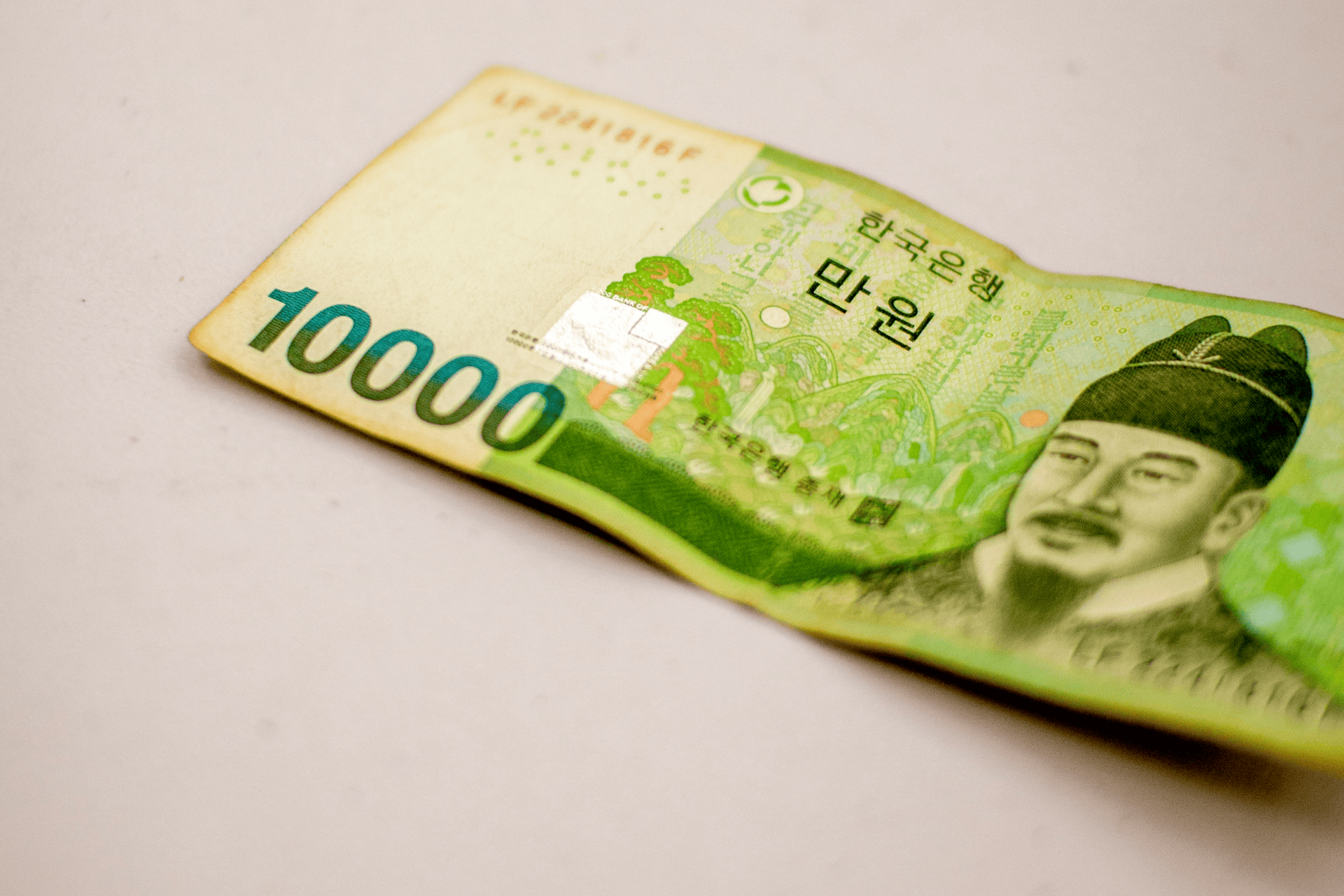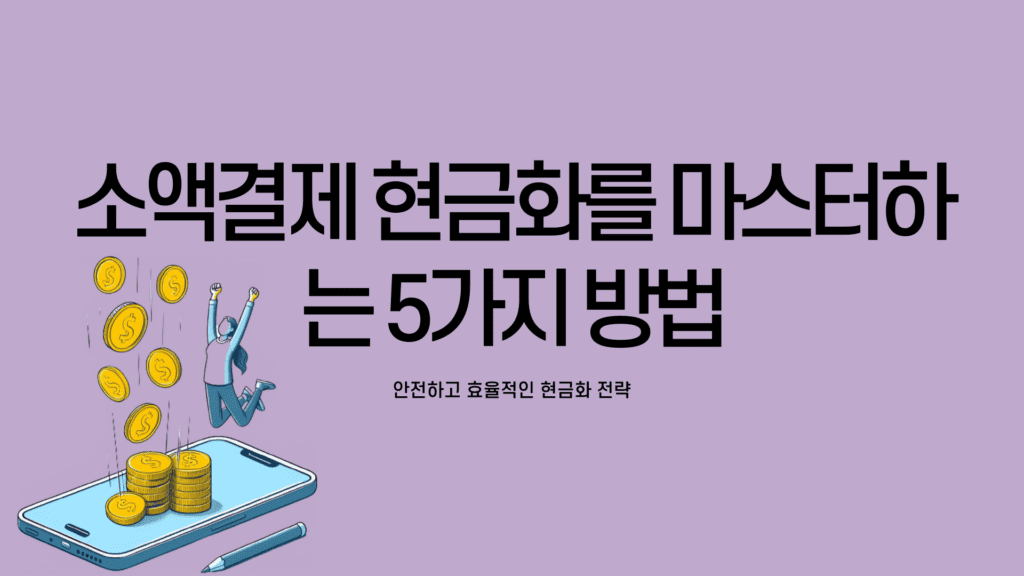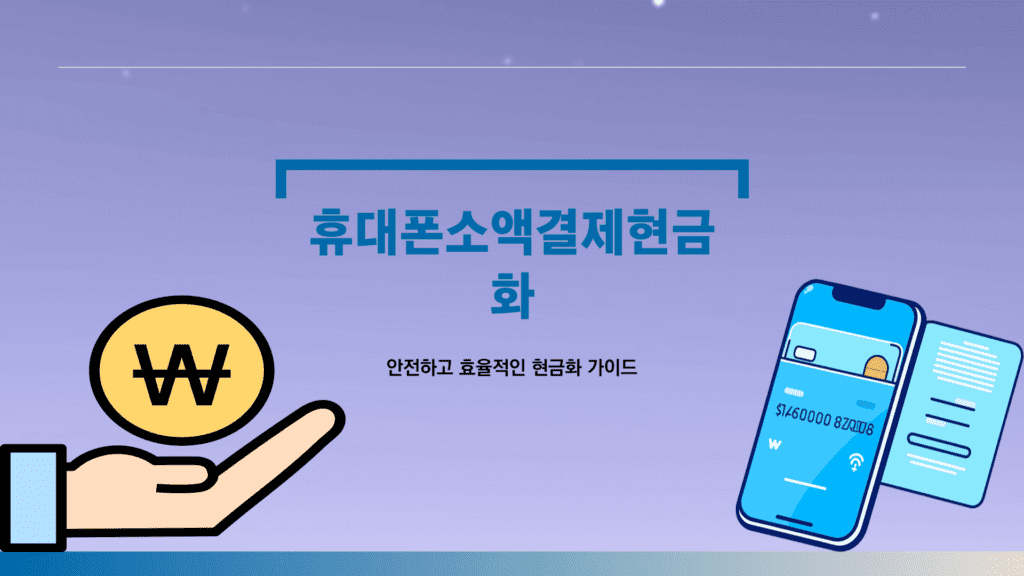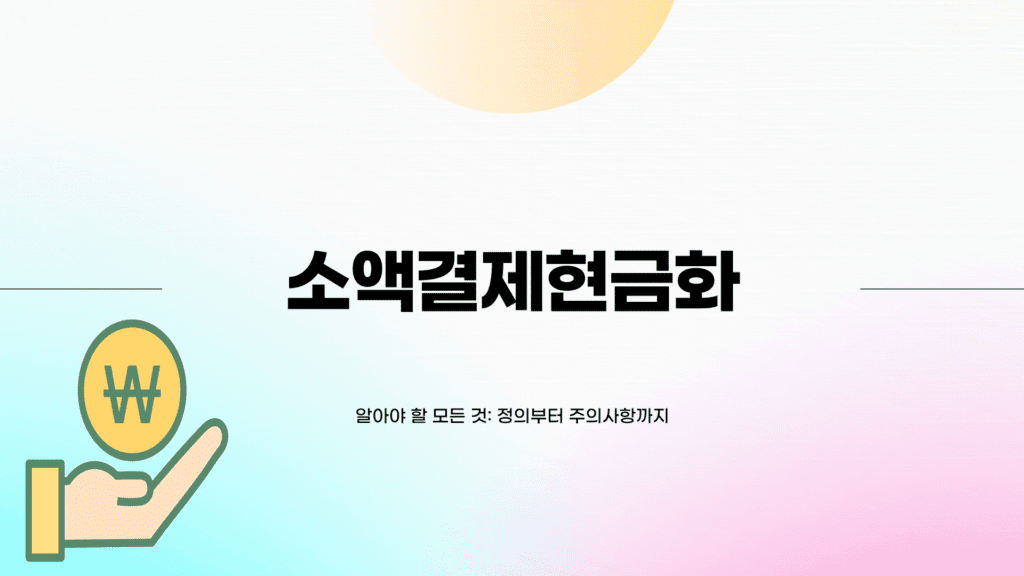소액결제 현금화 누구나 쉽고 간편하게
소액결제 현금화란?
소액결제 현금화는 소액결제 서비스를 통해 발생한 결제 금액을 현금으로 전환하는 과정을 의미합니다. 주로 통신사의 소액결제 기능을 이용해 상품이나 서비스를 구매한 후, 해당 결제 내역을 현금으로 돌려받는 방식으로 이루어집니다. 이는 예를 들어, 특정 앱이나 웹사이트에서 콘텐츠를 구매하거나 게임 재화를 이용하는 정보이용료 현금화를 통한 구독 서비스를 이용할 때 발생한 소액 결제를 현금으로 전환해 현금이 필요한 사람들에게 자금을 마련할 수 있도록 하는 방식입니다.
편리한 자금 확보
긴급하게 자금이 필요할 때 소액결제 현금화를 통해 비교적 간편하게 자금을 마련할 수 있습니다. 특히, 신용카드 현금화나 사용이 어려운 경우에는 더욱 유용하게 활용될 수 있습니다.
빠른 처리 과정
소액결제 현금화는 일반 대출 절차와 달리 별도의 심사나 복잡한 과정을 거치지 않고 빠르게 현금을 확보할 수 있는 방법으로, 자금 확보 시간이 단축되는 장점이 있습니다.
위험 요소
법적으로 논란이 될 소지가 있으므로, 각별한 주의가 필요합니다. 소액결제 현금화를 이용할 때는 사기성 업체를 조심해야 하며, 제도적 한계와 법적 문제에 대해 충분히 이해하는 것이 중요합니다.
소액결제 현금화의 장단점

소액결제 현금화의 장점
긴급한 자금 확보 가능
신용카드나 현금이 없더라도 핸드폰 소액결제를 통해 간편하게 자금을 확보할 수 있습니다. 긴급한 상황에서 신속하게 자금을 마련할 수 있다는 점이 큰 장점으로, 갑작스러운 지출이 생겼을 때 유용하게 활용할 수 있습니다.
간단한 절차
소액결제 현금화는 복잡한 심사나 대출 절차 없이 비교적 간단한 과정으로 진행됩니다. 대출과는 달리 신용 점수나 수입 증빙이 필요하지 않기 때문에 시간과 노력을 절약할 수 있습니다.
신용 기록에 영향 없음
소액결제는 신용카드 대출이나 현금서비스와 달리 신용 기록에 직접적인 영향을 주지 않습니다. 따라서 신용 점수에 불이익이 없으며, 신용도 관리에 민감한 사람들에게 유리한 방법입니다.
빠른 현금화
소액결제 현금화는 절차가 간단하여 현금화 속도가 빠르며, 당일 자금을 마련할 수 있어 긴급하게 현금이 필요한 사람들에게 적합합니다. 복잡한 승인 절차 없이 바로 현금을 확보할 수 있는 점이 장점입니다.
대출 이자 부담 없음
소액결제 현금화는 대출 상품이 아니기 때문에 추가적인 이자 부담이 없습니다. 이로 인해 대출과 달리 부담이 적고, 현금이 필요한 사람들에게 부담을 최소화하면서 자금을 마련할 수 있는 장점이 있습니다.
다만, 소액결제 현금화는 필요에 따라 유용하게 활용될 수 있지만, 무분별한 이용은 피하는 것이 좋습니다.
소액결제 현금화의 단점
높은 수수료
소액결제 현금화 서비스는 편리한 자금 확보 수단이지만, 수수료가 높게 책정되는 경우가 많습니다. 일부 업체는 결제 금액의 20~30%에 달하는 수수료를 부과하기도 하며, 이러한 높은 수수료로 인해 실제로 현금화되는 금액이 줄어드는 단점이 있습니다.
법적 문제와 규제 위험
소액결제 현금화는 일부 국가와 지역에서 법적으로 금지되거나 규제가 엄격할 수 있습니다. 특히, 소액결제 현금화가 불법으로 간주되는 경우 법적 처벌을 받을 위험이 있습니다. 불법 업체나 비공식적인 경로를 통해 현금화를 진행할 경우 법적 리스크가 더욱 커질 수 있으므로 주의가 필요합니다.
사기 위험
소액결제 현금화 시장에는 정식 업체 외에도 사기성 업체들이 존재할 수 있습니다. 특히 온라인 상에서 현금화 서비스를 제공하는 업체 중 신뢰할 수 없는 업체를 선택하면 사기를 당할 위험이 있으며, 이에 따라 금전적인 피해를 볼 가능성이 큽니다. 따라서 신뢰할 수 있는 업체를 선택하는 것이 중요합니다.
과도한 사용으로 인한 부채 위험
소액결제는 소액이기 때문에 부담이 적다고 느껴질 수 있지만, 반복적으로 이용할 경우 누적되는 결제 금액이 상당해질 수 있습니다. 과도한 소액결제 현금화는 부채 증가로 이어질 수 있으며, 상환하지 못할 경우 재정적 어려움을 겪을 수 있습니다.
개인 정보 노출 가능성
일부 업체들은 소액결제 현금화를 진행할 때 개인 정보나 결제 정보 등을 요구할 수 있습니다. 신뢰할 수 없는 업체를 통해 진행할 경우 개인정보가 유출되거나 악용될 위험이 있으며, 이로 인해 2차 피해가 발생할 수 있습니다.
제한된 금액
소액결제의 특성상 현금화 가능한 금액에 한도가 있어, 대규모 자금이 필요한 경우에는 한계가 있습니다. 보통 소액결제는 일정 금액 이하로 제한되어 있기 때문에 한 번에 많은 금액을 마련하기 어렵습니다.
소액결제 현금화는 긴급 자금이 필요한 상황에서 유용할 수 있지만, 이러한 단점을 고려하여 신중하게 판단하고, 과도한 의존을 피하는 것이 좋습니다.
소액결제 현금화 이용시 주의사항
합법적인 업체 이용
소액결제 현금화는 법적 논란이 있을 수 있는 분야이기 때문에 반드시 정식으로 등록된 합법적인 업체를 이용하는 것이 중요합니다. 비공식적인 업체를 이용하면 사기 피해를 입을 위험이 높아지고, 법적 문제가 발생할 수 있으므로 주의가 필요합니다.
높은 수수료 확인
소액결제 현금화 서비스는 높은 수수료를 부과할 수 있습니다. 따라서 거래 전에 반드시 수수료율을 확인하고, 너무 높은 수수료를 요구하는 업체는 피하는 것이 좋습니다. 수수료가 높으면 실제로 현금화되는 금액이 줄어들어 경제적 부담이 커질 수 있습니다.
개인 정보 보호
소액결제 현금화 시에는 결제 정보나 개인 정보를 제공해야 할 경우가 많습니다. 신뢰할 수 없는 업체에 개인정보를 제공하면 개인정보 유출이나 악용 등의 피해를 입을 수 있습니다. 반드시 신뢰할 수 있는 업체인지 확인하고, 개인정보 보호 정책을 확인하는 것이 좋습니다.
과도한 이용 자제
소액결제 현금화는 긴급 자금 확보 수단으로는 유용하지만, 이를 남용하면 부채가 쌓일 위험이 있습니다. 과도한 사용은 통신비 미납으로 이어질 수 있으며, 심한 경우 신용에 부정적인 영향을 미칠 수 있습니다. 계획적이고 절제된 사용이 중요합니다.
이용 한도 파악
소액결제에는 결제 한도가 존재하므로, 한도를 초과하면 현금화가 불가능합니다. 특히, 통신사에서 설정한 한도나 월별 한도를 초과할 경우 더 이상 결제를 할 수 없으므로 자신의 한도를 잘 파악해 무리한 결제를 피해야 합니다.
상환 계획 수립
소액결제 현금화는 대출이 아니지만, 월별 결제 대금을 갚아야 하는 의무가 있습니다. 상환 계획 없이 무작정 현금화를 시도할 경우, 연체나 채무 불이행으로 이어질 수 있습니다. 자신의 재정 상황을 고려해 상환 가능한 금액만큼만 이용하는 것이 좋습니다.
소액결제 현금화 다날 정책코드 해석 및 해결방안
결제 한도 초과에 따른 제한 이 코드는 소액결제 한도를 초과하거나, 결제 대행사의 자체 한도를 넘겼을 때 발생합니다. 결제를 진행하기 전에 금액을 줄이거나, 통신사 고객센터를 통해 한도 증액을 요청할 수 있습니다.
결제 미납 이력에 따른 제한 이전에 다날 소액결제를 통해 발생한 대금이 미납된 경우 표시됩니다. 다날 고객센터에 연락하여 미납 내역을 확인하고, 미납액을 납부하면 서비스 이용이 가능해질 수 있습니다.
통신 요금 미납으로 인한 제한 통신 요금이 연체된 경우 나타나는 코드입니다. 이때 통신사 고객센터에 문의하여 미납 요금을 정산한 후, 다날 고객센터에 결제 서비스 사용 가능 여부를 확인할 수 있습니다.
통신사 결제 제한으로 인한 서비스 중단 통신 요금 미납으로 인해 결제 서비스가 일시 중단된 경우 발생합니다. 이 경우 미납된 요금을 정산하고 통신사와 다시 결제 서비스 이용 가능 여부를 확인해야 합니다.
통신사의 정책에 따른 서비스 제한 통신사의 자체 정책에 의해 결제 서비스가 차단된 경우 발생하는 코드입니다. 해당 통신사에 문의하여 차단 이유를 파악하고 제한 해제를 요청하는 방식으로 문제를 해결할 수 있습니다.
다날의 소액결제 정책 코드는 결제 과정에서 문제가 발생했을 때 원인을 빠르게 파악하여 대응할 수 있도록 돕는 중요한 지표입니다. 각 코드의 의미를 이해하고,
해당 코드가 표시될 경우 안내된 방법에 따라 문제를 해결하면 원활하게 소액결제현금화 서비스를 이용할 수 있습니다. 다날 소액결제 정책 코드가 식별되었을 때는 문제의 원인을 정확히 이해하고 신중하게 대처하는 것이 중요합니다. 각 코드별로 주의해야 할 사항에 대해서 알려드리겠습니다.
다날 소액결제 문제의 각 코드별로 주의해야 할 사항
한도 초과 코드 결제 한도를 초과한 상황에서는 추가 결제를 진행하지 않도록 유의해야 합니다. 잦은 한도 초과는 통신사나 결제 대행사 측에 의심을 불러일으킬 수 있어, 향후 결제 서비스 이용에 제한이 생길 가능성이 있습니다. 한도 증액 요청을 고려할 수 있지만, 필요 이상의 과도한 사용을 피하고 계획적인 결제 습관을 유지하는 것이 중요합니다.
미납 이력 코드 결제 미납 이력이 발견되면 즉시 해당 내역을 확인하고 납부하는 것이 좋습니다. 미납이 누적되면 결제 서비스 이용이 장기적으로 제한되거나 신용도에 악영향을 줄 수 있습니다. 또한, 미납 해결 없이 계속 결제를 시도하면 결제 서비스 제한이 강화될 수 있으므로, 문제가 해결될 때까지 새로운 결제를 시도하지 않도록 합니다.
통신 요금 미납 코드 통신 요금 미납으로 인해 결제 제한이 발생한 경우, 연체 내역을 빠르게 확인하고 결제 완료 여부를 철저히 확인해야 합니다. 미납 요금이 해결되지 않은 상태에서 결제를 시도하면 통신사 정책상 더욱 엄격한 제한이 적용될 수 있으므로, 통신사와 상의하여 결제 후 서비스 정상화를 확인받는 것이 좋습니다.
통신사 결제 제한 코드 통신사 자체의 결제 제한이 걸린 상태에서는 신규 결제를 시도하지 않는 것이 좋습니다. 통신사 정책에 따라 제한이 완전히 해제될 때까지 일정 기간 소액결제 기능이 차단될 수 있으며, 무리하게 결제를 시도할 경우 추가 제한 조치가 이루어질 가능성이 있습니다. 반드시 미납 내역을 해결하고 통신사에서 확인을 받은 후에 이용을 재개해야 합니다.
통신사 정책에 의한 제한 코드 통신사 정책에 따른 제한이 걸렸다면, 자주 결제를 반복하거나 금액을 조정하는 행위는 오히려 상황을 악화시킬 수 있습니다. 통신사 고객센터에 문의하여 제한 사유를 명확히 파악하고, 추가 결제 시도의 제한 기간이나 해제 조건을 확인하는 것이 중요합니다. 상황을 명확히 이해하지 않고 지속적으로 결제를 시도하면 결제 서비스 복구가 더 어려워질 수 있습니다.
공통 주의사항
연속 시도 자제하는게 좋은데요. 각 코드의 제한 상태에서 연속적으로 결제를 시도하면 계정에 대한 의심이 증가하고, 장기적으로 결제 서비스 자체가 정지될 가능성이 있습니다. 따라서 문제 해결 후 확인을 거친 뒤에 결제를 재개하는 것이 안전합니다.
그리고 고객센터 협조 하는 방법도 있습니다. 코드 발생 시 결제와 관련된 문의 사항은 반드시 다날 또는 해당 통신사 고객센터를 통해 확인하는 것이 좋습니다. 자칫 잘못된 해결 방법을 시도할 경우 결제 기록에 문제가 생길 수 있어, 정확한 조치를 위해 고객센터의 도움을 받는 것이 중요합니다. 위와 같은 주의사항을 준수하면 다날 소액결제를 안전하고 신뢰성 있게 이용할 수 있으며, 코드가 발생했을 때도 효과적으로 대응할 수 있습니다.
소액결제 현금화 정식업체 선정 기준
소액결제 현금화 정식 라이센스 확인 방법 에대해서 알려 드리겠습니다.
사업자등록번호 확인
업체가 제공하는 자료나 공식 웹사이트에 명시된 사업자등록번호를 확인합니다. 사업자등록번호는 해당 업체가 합법적으로 사업을 운영하는지를 나타내는 기본 정보이므로, 이를 반드시 확인해야 합니다.
국세청 홈택스 조회
국세청 홈택스 사이트의 ‘사업자등록상태조회’ 서비스를 활용해 사업자등록번호를 조회할 수 있습니다. 여기에서 업체의 등록 상태와 휴·폐업 여부를 확인할 수 있으며, 이로써 업체가 정식으로 등록된 사업자인지 파악할 수 있습니다.
고객센터 운영 여부
신뢰할 수 있는 정식 사업자는 고객센터를 운영해 고객의 문의와 문제를 해결해줍니다. 업체가 고객센터를 운영하고 있는지, 그리고 연락처가 정확히 기재되어 있는지를 확인하는 것이 중요합니다. 고객센터가 실제로 운영되고 있지 않다면 신뢰성이 떨어질 수 있습니다.
이용 후기와 평판 확인
다른 이용자들의 후기를 통해 업체의 서비스 품질과 신뢰도를 확인할 수 있습니다. 인터넷 커뮤니티나 리뷰 사이트에서 해당 업체에 대한 후기를 찾아보며 평가가 긍정적인지, 혹은 부정적인지 판단하는 것이 도움이 됩니다.

소액결제 현금화 이용시 개인정보 보호 주의사항
필요 최소한의 정보만 제공
소액결제 현금화 과정에서 요구되는 정보는 꼭 필요한 정보만 제공하도록 주의해야 합니다. 불필요하게 과도한 개인정보를 요구하는 업체는 신뢰성이 떨어질 수 있으며, 필요한 정보 외에는 제공하지 않는 것이 원칙입니다.
정식 사업자 확인 후 정보 제공
개인정보를 제공하기 전에 해당 업체가 정식으로 등록된 사업자인지 반드시 확인해야 합니다. 정식 등록된 사업자는 개인정보 보호법을 준수할 의무가 있으며, 고객의 정보가 안전하게 보호됩니다. 국세청 홈택스나 고객센터를 통해 사업자등록번호와 운영 상태를 확인한 후 정보를 제공하는 것이 좋습니다.
개인정보 보호 정책 검토
안전한 업체라면 개인정보 보호 정책이 명확하게 명시되어 있을 것입니다. 해당 업체가 수집한 개인정보를 어떻게 관리하고, 어떤 목적으로 사용하며, 제3자와의 공유 여부를 설명하는 개인정보 보호 정책을 확인하는 것이 중요합니다. 투명한 정책이 없는 경우, 다른 업체를 고려하는 것이 안전합니다.
의심스러운 링크나 이메일 피하기
소액결제 현금화를 이용하는 과정에서 받게 되는 이메일, 문자 메시지, 링크는 신중하게 확인해야 합니다. 특히 의심스러운 링크나 비정상적인 이메일을 통해 개인 정보를 요구하는 경우 절대 응하지 않도록 주의해야 합니다. 정식 업체는 공식적인 방법으로만 연락을 주고받으므로, 사기성 메일이나 메시지를 경계해야 합니다.
보안이 강화된 장치 사용
개인정보 보호를 위해 결제 및 정보 입력은 보안이 강화된 장치에서만 진행해야 합니다. 공용 컴퓨터나 보안이 약한 네트워크에서 정보를 입력할 경우, 해킹 위험이 증가합니다. 가급적 개인 기기와 보안이 확보된 네트워크에서만 거래를 진행하는 것이 안전합니다.
비밀번호와 계정 정보 주의
소액결제 현금화를 위해 계정 정보나 비밀번호를 설정할 때는 유추하기 어려운 강력한 비밀번호를 사용하는 것이 중요합니다. 또한, 주기적으로 비밀번호를 변경하고, 가능한 이중 인증을 설정하여 계정을 안전하게 보호하는 것이 좋습니다. 결제와 관련된 계정은 타인과 절대 공유하지 않아야 하며, 보안 관리를 철저히 해야 합니다.
정보 제공 후 확인 및 삭제 요청
현금화 거래가 완료된 후에는 제공했던 개인정보가 안전하게 관리되고 있는지 확인하고, 필요 없는 정보는 삭제 요청을 하는 것도 좋습니다. 고객 정보 보호에 신경 쓰는 업체는 개인정보 삭제 요청에 적극적으로 응할 것입니다. 이를 통해 정보가 더 이상 필요하지 않을 때는 안전하게 삭제되는지 확인할 수 있습니다.
정기적인 정보 유출 모니터링
개인정보 보호를 위해 정기적으로 본인의 정보가 안전하게 보호되고 있는지 모니터링하는 것이 중요합니다. 신용정보 조회나 개인정보 유출 점검을 통해 의심스러운 활동이 있는지 주기적으로 확인하고, 문제가 있을 경우 즉시 해당 업체에 연락해 조치를 취하는 것이 좋습니다.
이러한 주의사항을 지키면 소액결제 현금화 이용 시 개인정보가 안전하게 보호될 수 있습니다. 신뢰할 수 있는 업체와의 거래를 통해 개인정보 유출 위험을 줄이고, 안심하고 서비스를 이용할 수 있도록 하는 것이 중요합니다.
개인정보의 소중한 경각심을 가져야하는 이유
개인정보 유출은 금전적 손실을 초래할 수 있습니다. 금융 정보나 계좌 정보가 유출되면 이를 악용해 부당하게 돈을 인출하거나 신용카드를 도용하여 신용카드 현금화를 하는 사례가 발생할 수 있습니다. 이러한 사기 행위로 인해 본인의 자산을 잃게 되는 것은 물론, 이를 해결하기 위한 시간과 비용도 추가로 소모될 수 있습니다.
사생활 침해로부터의 보호가 필요합니다. 개인의 주소, 연락처, 소셜미디어 활동 등이 외부에 노출되면 사생활이 침해될 위험이 있습니다. 이는 스토킹, 불법적인 광고 연락, 신상 정보 유포 등으로 이어질 수 있으며, 심리적 스트레스와 불안감을 초래합니다. 이러한 피해는 단순한 금전적 손실을 넘어 심각한 정신적 피해로 이어질 수 있습니다.
온라인 범죄에 악용될 수 있습니다. 해커나 범죄 조직은 유출된 개인정보를 이용해 사이버 범죄를 저지르거나 피싱, 스미싱 등의 방법으로 추가적인 피해를 발생시킬 수 있습니다. 개인정보가 유출되면 본인이 의도하지 않은 범죄에 연루될 가능성도 생기며, 이를 해결하기 위해 많은 노력이 필요할 수 있습니다.
사회적 신뢰도와 안전이 걸려 있습니다. 개인정보 유출은 본인의 신용도나 평판에까지 영향을 미칠 수 있습니다. 누군가 본인 이름으로 계약을 체결하거나 대출을 받는 등의 행위가 이루어지면, 신용 점수가 하락하거나 중요한 거래에서 신뢰를 잃을 위험이 있습니다. 이는 장기적으로 사회생활이나 업무에도 부정적인 영향을 미칠 수 있습니다.
결국, 개인정보는 우리가 일상을 안전하고 편안하게 유지할 수 있게 하는 기본적인 자산이기 때문에 이를 지키는 것이 중요합니다. 개인정보에 대한 경각심을 갖는 것은 단순한 예방 차원이 아니라, 자신의 삶의 질과 안전을 보호하는 필수적인 요소입니다.
소액결제 현금화 자주묻는 질문
소액결제 현금화를 함으로써 안전하게 내 정보를 지켜줄 수 있는 업체선정이 가장 중요합니다!
소액결제 현금화란 무엇인가요?
소액결제 현금화는 휴대폰 소액결제 시스템을 통해 구매한 상품이나 서비스의 결제 금액을 현금으로 전환하는 서비스입니다. 주로 통신사를 통한 소액결제를 활용해 현금이 필요한 경우, 일부 금액을 수수료로 지불하고 현금으로 전환받는 방식입니다.
소액결제 현금화는 합법인가요?
소액결제 현금화는 원칙적으로는 구매한 상품이나 서비스를 위한 결제로 사용되도록 되어 있어, 이를 현금화하는 행위는 대부분의 통신사 정책과 관련 법률에서 제한하고 있습니다. 불법적인 현금화 방식은 법적 문제가 발생할 수 있으므로 정식 업체를 통한 안전한 방법을 이용하는 것이 중요합니다.
수수료는 어떻게 책정되나요?
소액결제 현금화 서비스는 업체별로 수수료가 다르게 책정됩니다. 일반적으로 결제 금액의 20~30% 정도의 수수료가 부과되며, 수수료율은 현금화 금액이나 업체에 따라 달라질 수 있습니다. 이용 전 수수료에 대해 충분히 확인하고 결정하는 것이 좋습니다.
정식 업체인지 어떻게 확인하나요?
정식 사업자인지 확인하려면 해당 업체의 사업자등록번호를 국세청 홈택스에서 조회할 수 있습니다. 또한, 고객센터 운영 여부와 온라인 평판을 참고하여 신뢰성을 확인하는 것도 도움이 됩니다. 정식 등록된 업체는 개인정보 보호와 서비스 제공에 있어 더욱 신뢰할 수 있습니다.
현금화 과정은 어떻게 진행되나요?
보통 소액결제 현금화는 다음과 같은 절차로 진행됩니다. 먼저 소액결제 시스템을 통해 일정 금액을 결제하고, 결제된 금액에서 수수료를 차감한 나머지 금액이 고객에게 현금으로 입금됩니다. 각 업체마다 절차가 조금씩 다를 수 있으므로, 이용 전 과정에 대해 문의하는 것이 좋습니다.
소액결제 현금화는 즉시 현금화가 가능한가요?
대부분의 소액결제 현금화는 신속하게 진행되지만, 상황에 따라 다소 시간이 걸릴 수 있습니다. 보통 몇 분 내로 처리가 완료되지만, 업체의 상황이나 사용자의 통신사 정책에 따라 처리 시간이 달라질 수 있으니 확인이 필요합니다.
개인정보는 안전하게 보호되나요?
정식으로 등록된 업체는 개인정보 보호법에 따라 고객의 정보를 안전하게 관리할 의무가 있습니다. 다만, 신뢰할 수 없는 업체를 통해 현금화를 진행할 경우 개인정보 유출의 위험이 커질 수 있으니, 개인정보 보호 정책이 명확한 업체를 선택하는 것이 중요합니다.
미성년자도 소액결제 현금화를 이용할 수 있나요?
대부분의 통신사에서는 미성년자의 소액결제를 제한하고 있으며, 보호자의 동의 없이는 현금화를 포함한 소액결제 서비스를 이용할 수 없습니다. 보호자는 통신사를 통해 자녀의 소액결제 한도를 제한할 수 있으며, 이를 통해 미성년자의 부적절한 이용을 예방할 수 있습니다.
한도를 초과한 결제도 현금화가 가능한가요?
소액결제 한도를 초과할 경우 추가 결제가 불가능하며, 따라서 한도 초과 결제는 현금화가 불가능합니다. 통신사에서는 이용자의 신용도와 결제 이력을 바탕으로 소액결제 한도를 정하기 때문에, 정해진 한도 내에서만 현금화가 가능합니다.
불법 현금화와 합법 현금화의 차이는 무엇인가요?
합법적인 현금화는 정식으로 등록된 업체와의 투명한 거래를 통해 이루어지며, 통신사 정책을 준수합니다. 반면, 불법 현금화는 비공식 경로나 불법적인 방식으로 결제를 유도하며, 법적 처벌의 위험이 큽니다. 따라서 반드시 정식 등록된 업체를 통해 합법적인 방법으로 현금화를 진행하는 것이 중요합니다.
소액결제 현금화 최신글
소액결제 현금화 5가지 꿀팁 빠르게 현금화하는 최적의 방법
소액결제현금화 5가지 중요한 유의사항과 법적 규제 확인
휴대폰소액결제현금화 시 꼭 알아야 할 7가지 주의사항
소액결제현금화의 미래: 1분 만에 알아보는 최신 트렌드와 전망
- 소액결제현금화란 무엇인가? 정의와 기본 개념 소액결제현금화란 휴대폰 소액결제 기능을 활용하여 현금화 가능한 자산으로 ...





